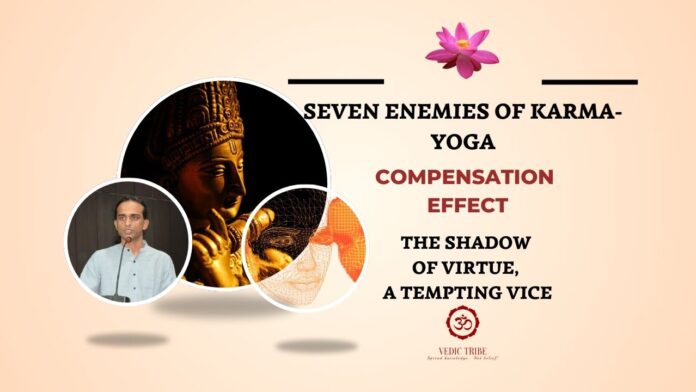The shadow of virtue, a tempting vice:
In the previous article, we discussed “weak benevolence” as an enemy of Karma Yoga and in this article we will discuss another enemy “compensation effect”.
The “compensation effect” is a psychological phenomenon where individuals, after engaging in a series of good deeds, feel entitled to indulge in negative behaviours. This “moral licensing” allows them to use their past good behaviour as an excuse for current immoral behaviour. They convince themselves past good actions cancel out present wrongdoings.
A Karma Yogi always strives to engage in morally righteous activities and at times feels morally licensed to engage in some occasional negative behaviours. This not only dilutes the effect of spiritual practice, but creates conflicting values in the mind of Karma Yogi.
The Danger of Moral Licensing:
For those practicing karma yoga, the compensation effect can be particularly insidious. The compensation effect can creep in unnoticed and undermine the very essence of karma yoga.
Accumulation of “Moral Capital”: Consistent selfless service and adherence to ethical principles can create a sense of moral superiority.
Enemy in disguise: Because karma yoga emphasizes action without attachment, the ego can cleverly disguise its desire for compensation. A person might genuinely believe they are acting selflessly, while subconsciously seeking validation or a sense of moral superiority.
Rationalization of Misconduct: This “moral capital” can then be used to justify occasional lapses in judgment, such as indulging in anger, gossip, or self-indulgence.
Erosion of Ethical Standards: Over time, these occasional transgressions can erode ethical boundaries, leading to a gradual decline in moral integrity.
The danger lies in the ego’s ability to subtly twist selfless action into a means of self-gratification. Even while performing acts of service, the mind can subtly seek rewards, thus defeating the purpose of karma yoga. The practice requires constant self-awareness and vigilance to avoid this trap.
Overcoming the Compensation Effect:
To overcome the compensation effect, it’s crucial to cultivate a spirit of humility and rigorous & continuous self-improvement
By cultivating humility, striving for continuous improvement, and surrendering to a higher power, individuals can overcome the insidious effects of the compensation effect and maintain a consistent path of ethical conduct on their journey of karma yoga.
To do:
Cultivate Humility: Recognize that even the most virtuous individuals are imperfect. Acknowledge one’s own shortcomings and strive for constant improvement.
Focus on Continuous Growth: Instead of resting on past achievements, focus on maintaining a consistent level of ethical conduct.
Surrender to the divine: The concept of “prapatti” in Vedanta (ie., complete surrender to the divine), will help you to cultivate humility and detachment from worldly desires. By acknowledging one’s limitations and seeking guidance from a higher source, individuals can overcome the ego-driven tendencies that fuel the compensation effect.
Openly Acknowledge Shortcomings: Regularly introspect and honestly acknowledge one’s shortcomings, both to oneself and to a spiritual guide. This can help to prevent the accumulation of “moral capital” and maintain a sense of humility.
Spiritual practice is about cultivating inner transformation, not accumulating external rewards. The compensation effect diverts attention from inner work and focuses it on the pursuit of external gratification. By overcoming this effect, practitioners can deepen their spiritual practice, cultivate true selflessness, and experience greater inner peace and liberation.
In the next article, we will discuss the seventh enemy “Self-aggrandizement”.
Madhwesh K
Vedic Tribe

